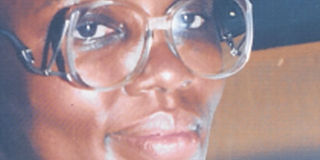The last word of Margaret Ogola

Dr Margaret Atieno Ogola, the author, who burst into the Kenyan literary scene in the mid-1990s with her award winning debut novel The River and the Source passed on in September 2011 soon after dropping the manuscript at Focus Publishers. PHOTO/FILE
What you need to know:
- One of the most defining features of the writer’s work is the undying optimism and regard for the family unit, with the woman as its foundation. She believed that whatever problems bedevilled Africa, including the HIV/Aids pandemic, will one day have a solution.
- However, the new book lacks the creative flair that is discernible in her past novels. This could be due to the fact that she wrote it when illness had taken its toll. She reports in the acknowledgement that she had been seriously ill at the beginning of 2010.
Like a weary athlete in a tough race who, aware of her waning energy, hands over the baton to the next runner to dash to the finish, Dr Margaret Atieno Ogola gave her last title Mandate of the People to her publisher and gasped, “Here’s the manuscript, run with it.”
The author, who burst into the Kenyan literary scene in the mid-1990s with her award winning debut novel The River and the Source passed on in September 2011 soon after dropping the manuscript at Focus Publishers.
The publisher “ran with it” to its posthumous publication and launch this year. Mandate of the People could, therefore, be viewed as Dr Ogola’s last word.
PROLIFIC WRITER
For nearly a decade and a half, Dr Ogola, a paediatrician and health administrator, juggled her stethoscope and pen quite successfully.
The new novel brings her title tally to six; four novels, a biography and a parenting guide.
With her hands full of professional as well as family and community service, she wrote mostly in the night and confessed to MercatorNet, an Australian online magazine, “I am a poor sleeper” in 2005.
Besides her work as medical director of Cottolengo Hospice for HIV/Aids orphans, she had engagements with numerous local and global agencies.
The River and the Source lifted the Commonwealth Writers Prize Africa region and Jomo Kenyatta Prize for Literature in 1995.
Even as she battled with cancer, Dr Ogola managed to pen a third novel, Place of Destiny, which won her a second Jomo Kenyatta Prize for Literature in 2007.
It is a semi-autobiographical tale of a woman dying of cancer that could as well turn out to have been a premonition treatise.
Her other books are I Swear by Apollo, a sequel to The River and the Source, Cardinal Otunga: A Gift of Grace, a biography (which she co-authored with Margaret Roche) and Educating in Human Love, a handbook on sex education she wrote with her husband, Dr George Ogola.
Mandate of the People explores the political intrigues and shenanigans of desperate politicians during elections.
It is set in an imaginary constituency called Migodi North in the run-up to an election.
Initially the contest is between perennial rivals JJ Sori (the incumbent) and GK Gwala (a third time loser).
As they embark on their campaigns, characteristic name-calling and mud-slinging, mobilising their supporters along ethnic and clan lines, a third force emerges in the name of Agade Adam to snatch electoral victory from the two.
ETERNAL OPTIMIST
Apparently, the people have decided to go for a complete change and do away with the traditional politics of division and parochial self-interest.
Agade’s campaign platform of issues and development seems to resonate with the people despite his parental background.
Perhaps this was the ideal political environment in Kenya that Dr Ogola wished to see in her lifetime: A country of such freedom and fairness that leaders are elected on their merit and integrity and without recourse to a candidate’s ethnic affiliations, heritage or other divisive considerations.
One of the most defining features of the writer’s work is the undying optimism and regard for the family unit, with the woman as its foundation. She believed that whatever problems bedevilled Africa, including the HIV/Aids pandemic, will one day have a solution.
She once admitted to being an incurable optimist: “Yes I am very hopeful. Considering everything that has happened… and the awareness that exists in the world now about the plight of Africa and the impact of HIV/Aids… And when everybody is concerned, surely human ingenuity can defeat any virus. We will defeat this one just as we defeated smallpox and polio and all the others.”
Such hope for a better future is evident in Mandate of the People in which two major characters, Gwala and Adam, rise from abject poverty and social obscurity to high economic and political status.
It is also noteworthy that Adam, a reluctant entrant to the race, has built a strong family base with his wife Suzanne, a prominent lawyer. It is the latter who noticed his leadership potential and prodded him to him to join politics.
However, the new book lacks the creative flair that is discernible in her past novels. This could be due to the fact that she wrote it when illness had taken its toll. She reports in the acknowledgement that she had been seriously ill at the beginning of 2010.




